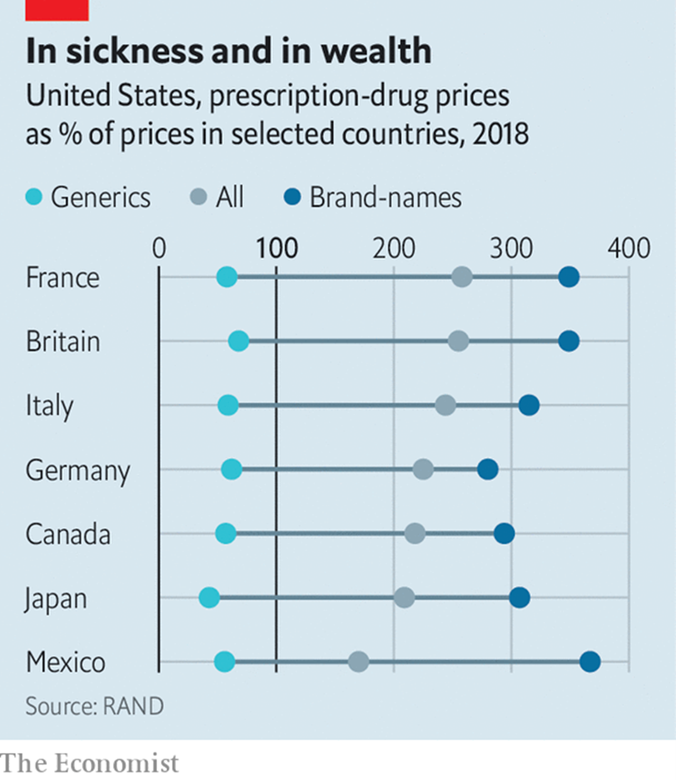The Daily Escape:

Mars on left, Earth on right – image by alofeed
The Biden administration released its list of 10 prescription medicines that will be subject to the first-ever price negotiations by Medicare. This is a big deal because Medicare covers 66 million older Americans, people who routinely take very expensive drugs.
Until recently it was illegal for Medicare to negotiate prices with drug companies. But the Inflation Reduction Act (IRA), passed last August, gives Medicare that power. It also forces companies to pay a rebate to Medicare if their drug prices rise faster than inflation. The Congressional Budget Office estimates that price-capping measures will reduce Medicare expenses (and the federal deficit) by $96 billion by 2031.
The list includes drugs for diabetes, arthritis, and Crohn’s disease, and could sharply lower medical costs for patients. Reuters says that the US Centers for Medicare & Medicaid Services (CMS) spent $50.5 billion between June 1, 2022 and May 31, 2023 on these 10 drugs. That was about 20% of the total cost of drugs in the Medicare prescription drug program known as Part D.
The WaPo had an opinion piece by David Goldhill, CEO of SesameCare.com, a digital marketplace for discounted health services: (brackets and emphasis by Wrongo)
“The pharmaceutical industry earns almost 50% of its worldwide revenue here [the US], as do medical information-technology firms. [Medical] Device makers earn 40% of their money in the US. And this understates things, because US revenue is generated from higher prices, so margins are greater. If the US accounts for half of a company’s revenue, it probably contributes at least 75% of its profits.”
This has always been the business plan for Big Pharma: Make your money in the US and take whatever scraps of profit you can get in other markets.
That market subsidy is paid by American taxpayers generally (through the funding of Medicare) and by US pill-takers specifically when they pay higher co-pay prices for the drugs that help with their chronic conditions. The Economist points out that prescription medicines in America cost two to three times more on average than in other wealthy countries:

The blue dots are the price paid in the US for brand name drugs. The grey dots are prices paid in the various countries for all US drugs sold in those countries. The comparison of brand name to generics shows how much greater the cost is to an American. It also follows that US patients’ out-of-pocket expenses, (the slice of drug costs not covered by insurance), are among the highest in the world.
It’s understandable why Biden’s move to start negotiations on some of the most expensive drugs has been fiercely opposed by the pharmaceutical industry. Essentially, high US drugs costs underwrite what amounts to a subsidy for buyers of the same drug sold when it’s outside the US.
Many of the Big Pharma have jumped on the legal bandwagon, challenging price-setting provisions in the IRA. More from the Economist:
“Since the law’s passage over 50 companies have blamed the IRA in earnings calls for clouding their prospects.”
A quick primer on drugs. Most medicines are either small-molecule drugs or large-molecule drugs. The former are the kind of pills that line our medicine cabinets. Large-molecule drugs, (also called biologics), are more complex and must be injected. The IRA grants biologics 13 years of pricing freedom after a drug is approved, while small-molecule drugs get only nine years post-approval before they must face Medicare’s bean counters. The industry estimates that small-molecule brands could lose between 25% and 40% in overall revenue due to the earlier cap on prices.
PhRMA, the pharma Industry’s lobbyist argues (and Republicans back them) that high US prices reflect the high cost of drug development. The pharmaceutical manufacturers are, of course, suing to stop the price negotiations. They say that allowing the government to negotiate lower bulk prices for drugs will stifle innovation, and will cut funds for research.
One thing that Big Pharma wants to avoid showing us is that they rely on smaller, more agile biotech firms for ideas. Between 2015 and 2021, 65% of the 138 new drugs launched by Big Pharma originated mostly from smaller firms. So, while innovation isn’t totally gone from the big firms, what they’re mostly doing is marketing the intellectual property of small pharmaceutical firms.
It didn’t take long for Republicans to jump on the decision to allow Medicare to negotiate drug prices. From Politico:
“Piggybacking on the pharmaceutical industry’s strategy, Republicans are working to persuade Americans that the Biden plan will stifle innovation and lead to price controls.”
Politico quotes Joel White, a Republican health care strategist:
“The price control is a huge departure from where we have been as a country….It gets politicians and bureaucrats right into your medicine cabinet.”
Politico says that the GOP effort to reframe the drug price debate may hurt them, since they plan largely to run on inflation, while the Biden plan will lower drug prices. Also they quote a new poll from the Kaiser Family Foundation (KFF) that shows 58% of independent voters trust Democrats to lower drug costs compared with 39% of Republicans.
Our politicians and pundits have bleated at us for years about being an “exceptional nation” – but what we really are is exceptionally gullible. As long as the large healthcare and pharmaceutical companies insist on standing between American consumers and their health needs, maximizing their profit will always come first.
We also continue to elect leaders who lobby for keeping corporations unleashed so that they can make as much profit as possible, while saying that the “market” will decide where the public good is prioritized. This keeps us hopelessly mired in a grossly expensive, and often ineffective healthcare system.
We continue to let ourselves be convinced by corporations and our politicians that reforming healthcare is impossible. That the solutions and methodologies used by other developed nations are substandard, and/or somehow immoral.
The Hill reported that the 14 leading US drug companies paid out more in stock buybacks and dividends from 2016 to 2020 than they spent on research and development. Those firms spent $577 billion from 2016 to 2020 on stock buybacks and dividends, $56 billion more than the $521 billion they spent on R&D. So, it’s oblivious how Big Pharma could easily fund their R&D with lower drugs prices.
It is also useful to remember that America has more healthcare billionaires AND healthcare bankruptcies than any other country. Those two things are inextricably linked.
As long as the pharmaceutical companies can maximize profits by buying politicians rather than by charging higher prices in other countries – the American people are the ones who will continue to get screwed.

Though the issue of drug prices is huge, we can see the same mindset across the business landscape. From the way the post office was downgraded (push by Republicans who would prefer that Fed Ex deliver our mail) to those who were paid by investors in the Weather Channel to push to end the weather bureau. Similarly, taxes – which should be much easier to pay for most, but the sellers of tax prep keep paying to keep taxes something we all pay via a private website.
I have never worked for the govt and my wife did only for a short time – so we both were in business (she ran bookstores). But sometimes the profit takers are not doing the best for America.
“Socialism!” “Government control of your healthcare!” “Politicians in your medicine cabinet!” “Stifling innovation” “Hobbling the best healthcare system in the world!” “Choking the flower of capitalist achievement” We are going to hear all of these canards, and more.
But where is it written in the capitalist handbook that buyers aren’t allowed to bargain on price?
Why is it not “government interference” when Congress singles out pharmaceuticals from the many other categories of goods for which the federal government elicits bids from prospective suppliers?
Wouldn’t it be questionable if no-bid contracts were the norm for billion dollar purchases by federal agencies across the board?
Does the “case” for pharmaceutical exceptionalism really hold water?
Is not the best explanation for this carveout the eye-popping millions lavished on thirsty campaign coffers?